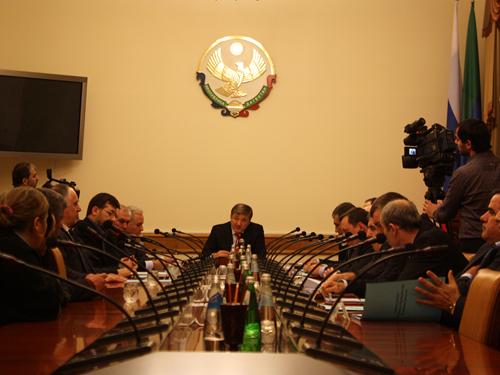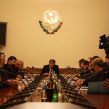
Dagestani Commission for Adapting Rebels to Civilian Life Yields Few Results in 2011
Publication: Eurasia Daily Monitor Volume: 9 Issue: 7
By:

The Dagestani government’s commission for adapting rebels to civilian life had mixed results in 2011. The commission was set up in November 2010 to help the government dispel the rising wave of militancy in the largest republic of the North Caucasus. The Dagestani government’s press service told a reporter for the Kavkazsky Uzel (Caucasian Knot) website that 50 former rebels had requested the commission’s assistance and over 40 were rehabilitated. Rizvan Kurbanov, formerly Dagestan’s deputy prime minister and currently a Russian State Duma deputy, hailed the commission’s success, saying it had “reversed the trend” in the republic (www.kavkaz-uzel.ru, January 4).
However, there was a 20 percent increase in the number of victims of attacks in Dagestan in 2011. More people died in attacks in Dagestan last year than in all other republics of the North Caucasus put together. A total of 413 people were killed and 411 wounded in this easternmost republic of the North Caucasus in 2011, in comparison to 685 killed and injured in 2010. In 2011, 173 people officially considered rebels were killed in the republic and at least 103 rebel suspects were arrested. In 2010, 176 rebels were killed and 41 suspects were arrested. A total of 111 law enforcement agents were killed and 281 wounded in Dagestan in 2011, while in 2010 these numbers were 124 and 200, respectively. An astounding number of civilians were killed and wounded in Dagestan in 2011 – 129 and 130 respectively. In 2010, 78 civilians were killed and 107 injured. The number of kidnappings grew from 18 in 2010 to 31 in 2011 (www.kavkaz-uzel.ru, January 5).
The rising number of civilian victims in Dagestan means the conflict there is still far from being resolved decisively. It also suggests the warring sides in the republic do not have peaceful intentions, despite the fact that there was much talk throughout 2011 about rehabilitating and adapting the rebels. Kavkazsky Uzel follows the government narrative when counting the number of rebels killed, so some of the slain suspected rebels may actually have been civilians.
The Russian journalist and public figure Maxim Shevchenko, known for his work in the North Caucasus within the framework of the Russian Public Chamber, said that the creation in Dagestan and Ingushetia of commissions for adapting rebels to civilian life provided “at least a glimmer in the hopeless situation in these two republics.” Shevchenko works for the First TV channel in Moscow and has a reputation for being a pro-Kremlin journalist. Even Shevchenko, however, recognizes that, as he put it, “the siloviki are obstructing the negotiation process. They still want to use the same methods they used in the past years – that is, to carry out special operations and annihilate militants.” According to the pro-Kremlin journalist, “on the one side, the underground representatives should adapt, on the other – the siloviki themselves [should adapt]. Without the adaptation of the siloviki, there will be no reconciliation.” Shevchenko argues that rebels who have surrendered have to reject violence, but do not have to renounce their views, including their possible disagreements with the government. (www.kavkaz-uzel.ru, January 4).
Despite the sensible statements by Shevchenko, the law enforcement agencies apparently continued to commit abuses in Dagestan. Shevchenko himself was voted out of the Russian Public Chamber and was not included on its latest list of members. Using police and military force to solve an essentially political conflict is a dubious act in itself. In Dagestan, this government strategy is aggravated by the virtual absence of mechanisms of civil control over the military and police agencies. The problem is aggravated as various levels of authority, such as republican and federal, regularly clash and the republican authorities have few instruments to influence the federal agencies while the latter increasingly seek full control over important aspects of life.
An expert on the North Caucasus from the Russian Academy of Sciences, Ruslan Kurbanov, told Kavkazsky Uzel that the adaptation commission in Dagestan did not achieve the results it aspired to. No change was made in the politics, tactics and methods of the law enforcement agencies, according to Kurbanov. “The commission examined over 40 cases, but this is a drop in the ocean,” he said. “There are no hardcore militants among the ‘adapted’ people. Most of them are young people, romantics, who, having read various jihadist websites, came to Dagestan to see it.” The commission is not prepared or even designed to face real militants, and therefore the government has not found a way to resolve the insurgency issue in the republic, Ruslan Kurbanov concluded (www.kavkaz-uzel.ru, January 4).
In 2011, Dagestani Muslims reverted to mass protest actions to defend their rights. On November 21 and November 24, several thousand Dagestani Muslims protested on the central square in Makhachkala after several Muslims were kidnapped by the security services. The police subsequently cracked down on the organizers of the protests, and no action was taken to end police malpractice in the republic (www.kavkaz-uzel.ru, November 27, 2011).
Moscow is trying to substitute reforms with injections of cash into the North Caucasus in general and Dagestan in particular. Moscow plans to put $100 million into the education system in Dagestan in 2012, which is more than any other region of the Russian Federation will receive for the same purpose (www.kavkaz-uzel.ru, January 8). However, Moscow’s ability to trump discontent in the North Caucasus with cash infusions is no longer unquestionable. On the one hand, the state’s coffers are slimmer than in the past and Moscow is more aware of its limitations. On the other hand, the Russian public increasingly dislikes prioritized financing of the North Caucasus. Russian opposition figures such as Aleksei Navalny have sharply criticized Putin’s government for overly generous support of the North Caucasus (https://echo.msk.ru/programs/albac/842708-echo/#element-text). As Russia enters a period of change with presidential elections scheduled for March 2012, the risks for the North Caucasus also increase given that the region will inevitably be one of the components of the political struggle between various forces in Russian society.




